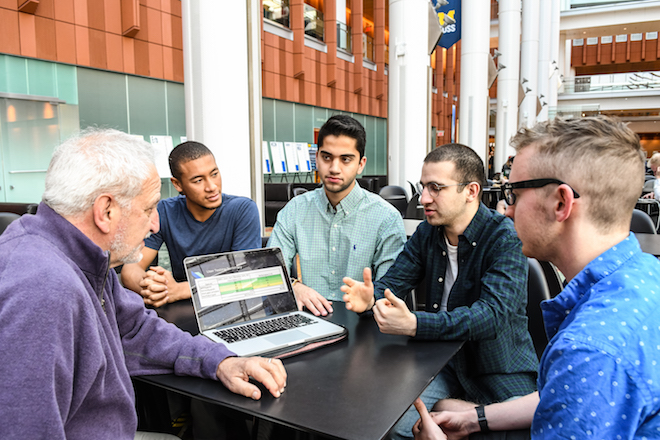
A team of University of Michigan students (pictured from left to right are Tristan Neeb, Aklavya Kashyap, Shayan Shafii, and Sean Dew) created a productivity app with Robert Pasick, a professor at the Ross School of Business. Photo by Randy Maschaka for Michigan Ross
Create more and consume less. More independent and less dependent. Ultra-productive.
These were the goals that five recent University of Michigan graduates had in mind when they developed a productivity app that pairs with Amazon’s Alexa to help people set and achieve their goals.
“Iris” is an application that enables people to track their goals on a daily, weekly, or monthly basis. Created by Shayan Shafii, Reid Ovis, Aklavya Kashyap, Tristan Neeb, and Sean Dew, the app takes the pen-to-paper goal setting approach and leverages intention-tracking voice-assisting technology to maximize productivity. For instance, Iris can aggregate statistical insights on how to repeat productive activity and avoid counterproductive behaviors.
“One might have an overarching intention to get in better shape, and that intention could be comprised of prerequisite goals like going to the gym and abiding by a specific schedule every day,” Shafii says. “An intention-tracking voice assistant allows someone to store information regarding these intentions or goals in a cloud, while interfacing with them using their natural voice.”
SELF-AWARENESS SPURS INNOVATION
The idea originally came from Robert Pasick, a professor at Michigan’s Ross School of Business. Pasick’s book, Self-Aware: A Guide for Success in Work and Life, discusses how people can successfully set goals and meet them through self-awareness. Additionally, Pasick also teaches a course called “Managing Professional Relationships in the Workplace,” where students gain a better understanding of self-awareness and master the competencies of emotional intelligence.
“It is a highly interactive course where students work in teams to develop their own personal life plans,” Pasick says. “Students are required to keep a daily learning journal where they track lessons learned about themselves and learn to manage their time better.”
Pasick pitched the idea to an engineering class where Kashyap, Ovis, and Shafii were recruited to develop the concept into reality. Neeb and Dew, who were students of Pasick, collaborated with the developers to pinpoint the most crucial parts of self-awareness and goal setting.
CREATING A MORE PRODUCTIVE WORLD
Iris is personable and knows its user’s tendencies and how those habits influence specific goals. Users set personal goals for the week in the context of physical, mental, and social capabilities, Kashyap says. Each week, users can renegotiate their goals and Iris provides a detailed breakdown on how successfully they have achieved previously set goals.
“We hope that users will be able to gain a greater self-awareness and by extension, schedule their days and lives with more purpose,” Kashyap says.
Ovis says the hope of creating Iris is to enable users to be more productive in an increasingly dependent world.
“In a society that consumes information on a meta scale, we want to have more creations to show for it,” he says. “And the first step in creating something is setting a goal toward it. In this way, we believe we can help kickstart this movement.”
And that society is highly relevant to college campuses, where students are tasked with balancing their academic life and their personal.
“Our application was built with the pressure of a busy collegiate environment in mind and is aimed to aid college students who want to take a greater ownership in their lives,” Kashyap says. “These students wish to achieve their academic goals, but not at the expense of a healthy lifestyle. This persona resonated with all of us and is a situation which we recognized to be relevant to ourselves and the peers around us.”
OVERCOMING THE HURDLES
One of the biggest challenges, Shafii says, was ensuring that the Iris experience reflected authentic human conversation.
“The default behavior of the program was that you would have to open the entire application before each command and it was just totally unnatural,” he says. “It would be like introducing yourself before every sentence in a conversation.”
On top of that, the students had to pinpoint what kind of user they were developing the app for.
“We learned that the most successful apps have a specific persona to which they cater,” Ovis says. “Not everyone is going to use your app, so it is important to identify who will use your app and create everything from aesthetic design specific functionalities with that user in mind.”
For Shafii, his Ross education helped overcome challenges in ways that he didn’t quite expect.
“A big part of taking an idea from conversation to execution is about running meetings effectively, scoping deliverables, and ensuring that the team members communicate project developments accordingly,” he says. “I think the attention that I paid to these organizational elements can be solely attributed to my business background.”
Now, the group is in talks with various partners at the university in hopes of pairing the app with select courses and initiatives. In addition to making life a little bit easier, they hope the app will motivate others to be more thoughtful in developing a productive future.
“If nothing else, I hope it urges the developer community to think more critically about the tools we build to make ourselves more productive,” Shafii says. “In my opinion, too much programming talent is being used to design useless games and redundant food delivery services. I want it to trigger more critical thought about how we can use technology to make ourselves faster, smarter, happier, and more effective.”
DON’T MISS: MICHIGAN UNDERGRADS LAUNCH CRYPTOCURRENCY TRADING FUND or HOW MICHIGAN ROSS PLANS TO TURN AROUND ITS DIVERSITY NUMBERS











Questions about this article? Email us or leave a comment below.